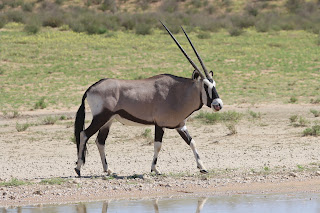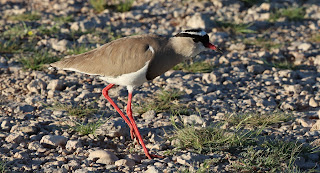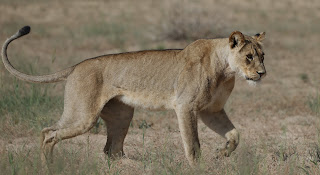We arrived at Nossob late afternoon on 24th February for a five night stay. The first night we stayed in a chalet because there were no camping sites available. However, later in the evening there were several vacant camping spots! What is happening is that people are booking a year in advance & paying for the site, but then something comes up & they can't go. Very annoying!
Since my last visit many years ago the camp has been both extended & upgraded. There is now a premium camping site with your own bathroom etc. It looks very nice. The hide has also been moved slightly overlooking a small waterhole & is a great spot to while away the time in the mid day heat. We were in the normal camping area but one of the best ones with ample shade which is really needed here.
Migrant Abdim's Storks.
Lanner
This bird had made the camp waterhole its home
& was present every day.
This bird got attacked by another individual!
This bird is upside down trying to protect itself.
Gabar Goshawk.
Ring necked Dove at the waterhole in camp.
Adult Wattled Starling in full breeding plumage.
A highly nomadic species.
Common in this area after the good rains.
Singing
One of the species hunted by
the Lanner Falcon.
Southern Masked Weaver
Yellow Canary
Adult male.
Male & female.
Grey-headed Sparrow.
Shaft-tailed Whydah
Larklike Bunting coming to drink.
Crimson-breasted Gonolek
Yellow Mongoose
A daily visitor around our camp.
Abdim's Storks roosting
at the waterhole in camp.
Sunset from the camp.
Spotted Eagle Owl on a day roost in camp.
Viewing from the hide was quite good with lots of small birds coming to drink together with both Lanner & Gabar Goshawk trying to predate them.
Vast open semi-desert areas line the road.
Gemsbok
Many Gemsbok were drinking from the recent rain
puddles in the road.
Springbok were abundant in the river bed
after the recent rains.
Yellow Mongoose.
This individual was catching Termites
as they emerged from the ground.
Kori Bustard
This bird was displaying.
Crowned Lapwing
This bird had a nest close to the track
& was fearless!
Nossob is in prime game viewing area. Basically each day one either goes north or south along the main road, visiting each waterhole.
Burchell's Sandgrouse come in to drink
at a couple of nearby waterholes in the morning.
Lanner
Every waterhole has a Lanner, preying on small birds
which come to drink there.
This gives great photo opportunities.
Gemsbok play fighting.
Red Hartebeest
Secretarybird
Five Secretarybirds were drinking
at this one waterhole.
Lappet-faced Vultures.
Immature Bateleur.
Adult Bateleur in a nearby tree
overlooking the waterhole.
An incredibly pale (almost white)
pale phase Tawny Eagle.
The more normal phase of Tawny Eagle
Martial Eagle
Immature Black-chested Snake-eagle.
This is a plumage which somehow is not often seen.
Dark phase Booted Eagle.
An uncommon to rare species in the park.
Cape Crow is the only Corvid able to live
in these harsh conditions.
Lion
We came across these two Lionesses just south of Nossob Camp. We watched them for an hour & they were incredibly relaxed and gave us amazing views. We were the only people there, which made this sighting extra special.
She was incredibly close but very relaxed.
She knew we were there.
She was close!
Taken through the windscreen with a cell phone!
They eventually moved off & found a tiny patch of shade
next to the road sign!
Sociable Weaver's nest.
Sociable Weaver
Lesser Grey Shrike
A welcome break in the mid-day heat.
We left Nossob Camp mid morning on 1st March for the long drive south & west to Mata Mata Camp, which was to be our home for the next four nights. We chose to drive the high dune road, which is away from the river bed &as its name suggests crosses the high red rolling dunes of the Kalahari. Game & birds are a lot less prolific in this habitat, but it made for an interesting drive.
Steenboks favour the dune habitat
rather than the river beds.
Pale Chanting Goshawk.
Red-necked Falcon
Lanner
White-quilled Bustard
Common in the dunes.
Giraffe hunted to extinction in this area
around 100 years ago.
Fourteen were re-introduced a few years ago
& appear to be doing well.
Red Hartebeest
It had been an excellent few days in & around Nossob, which is probably the richest game area of this park.





























































































































No comments:
Post a Comment